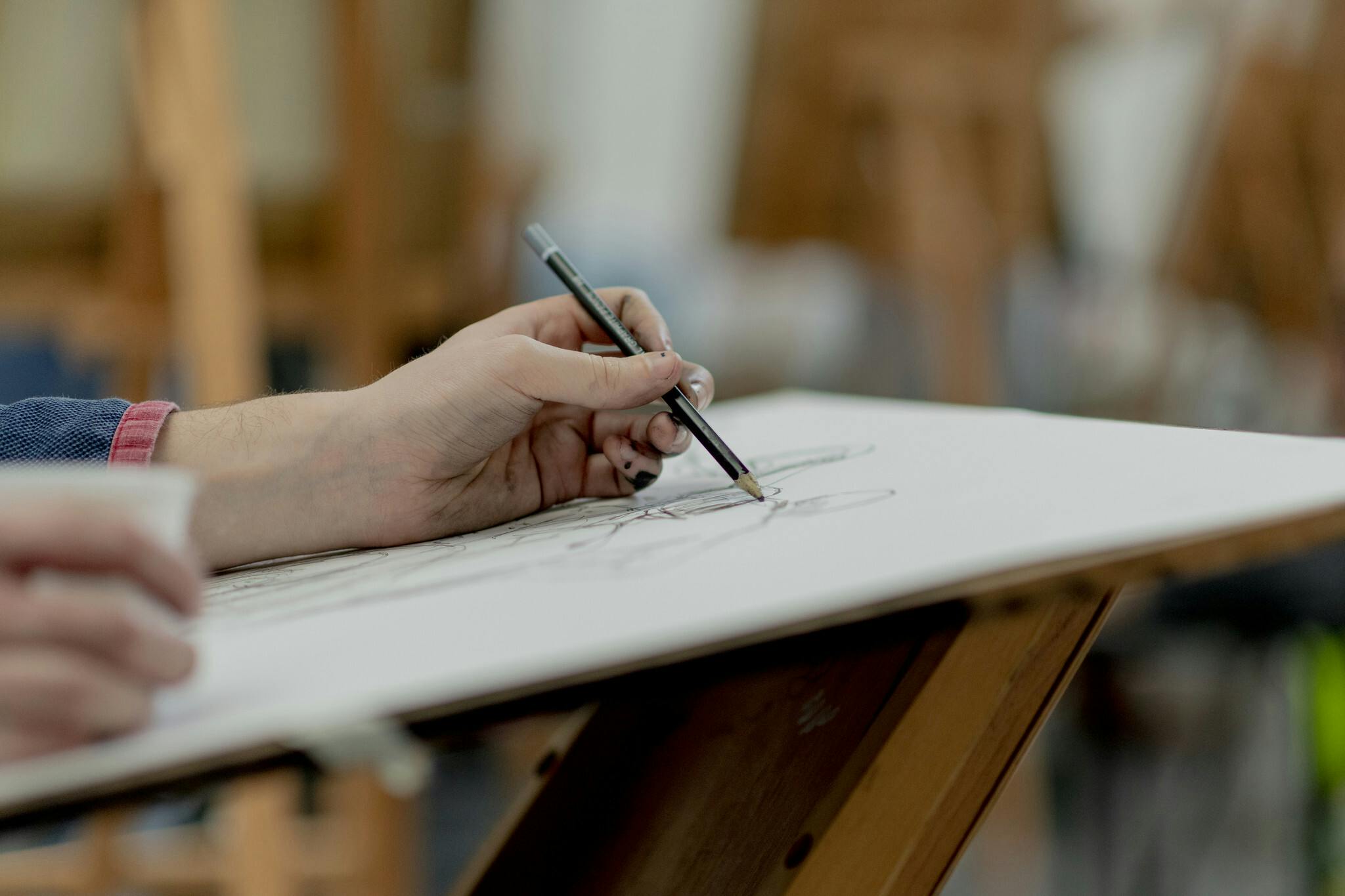Latest News
A Third Gaze: Life drawing with Paris College of Art
Wednesday, 23 March, 2022 — BA (Hons) Painting, Drawing & Printmaking student Karmin O’Brien explores the possibility of a digital third gaze during our Paris College of Art life drawing collaboration event.
<p><strong>Guest writer:</strong> <a href="http://www.instagram.com/karminrosanna.studio" target="_blank" rel="noreferrer noopener">Karmin O'Brien</a>, <a href="https://www.aup.ac.uk/courses/undergraduate/ba-hons-painting-drawing-printmaking">BA (Hons) Painting, Drawing & Printmaking</a> student</p>
<p dir="ltr"><br />On Friday 11 February, in time for 8am, myself and students from various years and courses raced to the Drawing Lab to participate in a virtual life drawing event with Paris College of Art. I decided to draw predominantly with charcoal for the day as this is the medium I feel most confident with - there is so much variety to the medium which I really enjoy. I also started using ink but applied this to the paper with a pencil as it gives you such a sharp, deep line.</p>
<p dir="ltr">The aim of this session was to experience the differences of drawing the body from life with our life model; in comparison to drawing Paris’ life model through a digital live stream. When students were offered the opportunity to be a part of this event I jumped at the chance. Life drawing is a major part of my creative practice and is something I believe is incredibly important within art education. Life drawing is not just about training and honing your skills in perception and being able to translate this onto paper, it is also about connection, empathy and dignity.<br /></p>
Karmin and her fellow students taking part in life drawing with Paris College of Art.
<p dir="ltr">For half of the morning, all of us in Plymouth drew Paris’ life model through their digital live stream onto paper. I personally found that the impact this had on my drawing was that I created more expressive drawings due to the detail that gets lost through the live stream. The border of the screen was also already set up, you couldn't see any more than the camera was providing. Therefore, when it came to drawing from our own life model in the second half of the session, I could focus more on the details and make my own decisions on how much I wanted to include in my own drawing; and where I wanted the border of my drawing to stop.</p>
<p dir="ltr">As part of these experiences, we also downloaded digital drawing apps to use on our phones to draw the life models on screen. For me, digitally drawing a life model was very dissatisfying due to the lack of physicality in materials. Neither digital nor physical drawing is better than the other; they are just different.<br /></p>
Plymouth College of Art x Paris College of Art Drawing event.
<p dir="ltr">With Paris College of Art, we drew for five hours; from 8am until 1pm. This was undoubtedly exhausting but equally rewarding and challenging. After lunch, we continued our life drawing without Paris for another three hours. There were clear differences between drawing a life model who is in the room with you in comparison to through a screen. One key thing that was clear to me is that there is absolutely no hiding in real life. When the model is in the room with you there is a direct presence that encourages empathy and you find yourself being confronted by the ‘other’. It is about recognising their need to be alive and themselves. In a life drawing room, you are inhabiting all senses of the environment by not only looking; but listening and smelling too. You can hear the breath, see the gaze and sweat. Online, however, there is a clear separation from this.</p>
<p dir="ltr"> </p>
<p dir="ltr">Since the Covid-19 pandemic, our relationship as a society with the digital world has changed. We have heavily relied on the digital world to carry our lives as much as possible through video calls and other online communication in order to keep in contact because physically, we couldn't. As a result of this, we have developed another way of looking. This third gaze is separate from the male and female gaze and is more about viewing somebody through the digital world. I felt this when drawing from the screen of Paris’ life models, in the Drawing Lab in Plymouth we never received a returning gaze, which is something you do experience in life drawing physically. Although the life model in Paris knew we were drawing him, the lack of physical presence and returning gaze was quite strange. I felt it expanded the separation between us and the life model.<br /></p>
Karmin taking part in the life drawing session in our Drawing Lab.
<p dir="ltr"><a href="https://www.aup.ac.uk/people/richard-kenton-webb">Richard Kenton Webb</a>, the Subject Leader of my course BA (Hons) Painting, Drawing & Printmaking, Véronique Devoldere, the chair of Fine Art and the MA/MFA in Drawing at Paris College of Art, and Jan-Philipp Fruehsorge, the director of The Drawing Hub in Berlin and a lecturer at Paris College of Art; led this event. </p>
<p dir="ltr">The aim of the event was to question how we can harness these experiences of drawing through the digital and physical space. In October 2022, Richard is holding a Drawing Conference at Plymouth College of Art based on this event which I am really looking forward to. Students that participated in the event in Paris are also flying over to join the conference which is incredibly exciting.</p>
<p dir="ltr"> </p>
<p dir="ltr">As a group in the <a href="https://www.aup.ac.uk/resources/drawing-studios">Drawing Lab</a>, throughout the day we as a collective held a sense of unity and therefore were understanding ourselves through the other. You are not only looking at the model but at yourself.</p>
<p dir="ltr"><a href="http://www.instagram.com/karminrosanna_art">Keep up to date with Karmin’s work on Instagram @karminrosanna_art </a><br /></p>
